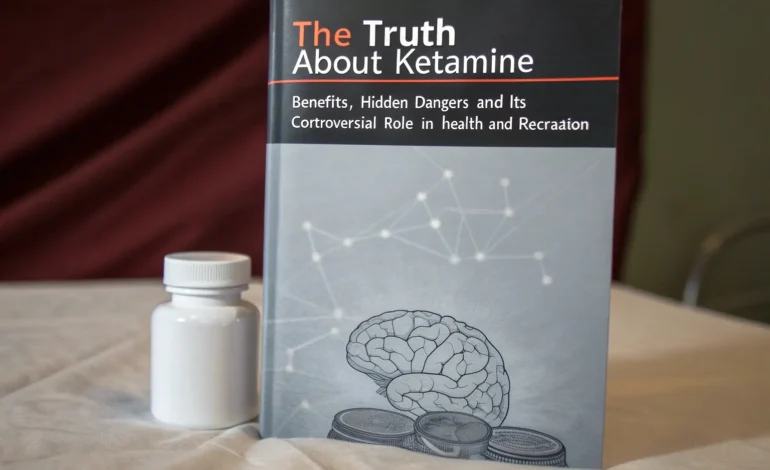The Truth About Ketamine: Benefits, Hidden Dangers, and Its Controversial Role in Health and Recreation
Ketamine is gaining attention for its potential to relieve chronic pain and depression, but it’s also being misused with serious consequences. While medically supervised use can be life-changing, recreational use

Ketamine has been a widely discussed substance in recent years, drawing attention for its use in medical settings, its potential benefits, and the controversy surrounding its recreational use. As the drug continues to make waves in both the medical and social spheres, it’s essential to take a closer look at what it really is, who it helps, and what hidden dangers it may carry. The rise of Ketamine therapy has offered new hope for many, yet while for others, its recreational use has led to tragic consequences, including the untimely death of actor Matthew Perry — a claim that
remains heavily debated. In this editorial, I’ll explore both the benefits and hidden dangers of ketamine, its role in treating conditions like CRPS, and why it’s become a dangerous substance for some when misused.
What Is Ketamine and How Is It Used?
Ketamine is primarily known as an anesthetic used in medical settings for both humans and animals. It’s a powerful dissociative drug, meaning it creates a feeling of separation from the body, often leading to altered perceptions of reality. Originally used in surgical procedures to induce anesthesia, ketamine has more recently been found to have
therapeutic effects for mental health disorders and chronic pain conditions. , leading to the development of controlled Ketamine therapy for treatment-resistant cases. While its official medical uses are well-known, it’s also frequently used recreationally, which has contributed to its complicated reputation. Known as “Special K” in recreational circles, ketamine is often abused for its hallucinogenicand euphoric effects, making it a popular drug in club scenes and among partygoers. However, what many don’t realize is that its misuse can lead to serious health risks.

What Are the Benefits of Ketamine Therapy?
The Benefits of Ketamine: More Than Just an Anesthetic In recent years, ketamine has sparked interest among medical professionals for its promising applications in treating conditions such as chronic pain, depression, and post-traumatic stress disorder (PTSD).
Can Ketamine Help with Chronic Pain Relief?
One of the most notable benefits of ketamine in the medical field is its ability to treat chronic pain, particularly conditions like Complex Regional Pain Syndrome (CRPS), a debilitating disorder often caused by injury that results in severe, ongoing pain, swelling, and changes in skin color. Traditional painkillers, including opioids, are often ineffective for CRPS, which is where ketamine comes in. Infusions of ketamine have shown to provide relief from this chronic pain, often after other treatments have failed. In fact, ketamine infusions have been heralded as a lifeline for people suffering from CRPS, as well as other pain disorders like fibromyalgia and neuropathy. It works by interrupting pain pathways in the brain, providing a unique and often highly effective alternative to traditional treatments.
Is Ketamine an Effective Mental Health Treatment?
Ketamine has also garnered attention for its ability to treat depression, anxiety, and PTSD. Ketamine therapy has been described as a game-changer for individuals who have not responded to raditional antidepressant medications. Unlike conventional antidepressants that can take weeks to work, ketamine has shown rapid effects, sometimes providing relief from symptoms within hours. Many people who struggle with treatment-resistant depression and other mood disorders have found that ketamine infusions provide significant relief and even long-term improvements in their mental health. The FDA has approved esketamine (a nasal spray form of ketamine) for depression in some cases, recognizing its potential as an effective treatment for people who have not found success with other therapies.
What Are the Hidden Dangers of Ketamine?
While the medical uses of ketamine offer great potential, it’s important to recognize the hidden dangers of the drug, especially when used improperly or abused.
Is Ketamine Addictive?
Ketamine is highly addictive, especially when used recreationally. When people begin to misuse it for its hallucinogenic and euphoric effects, they run the risk of developing a psychological dependence on the drug. The dissociative effects of ketamine can lead to a detachment from reality, causing users to feel disconnected from their emotions or surroundings. While these effects might seem appealing to some, the long-term impact can be devastating. Repeated use of ketamine, especially in high doses, can lead to bladder and kidney damage, memory loss, and cognitive dysfunction. There have also been reportsof psychotic episodes, delirium, and hallucinations that last long after the drug’s effects wear off. In particular, chronic abuse of ketamine can lead to “K-hole” experiences, where users lose touch with reality entirely, which can cause significant harm to mental and physical health.
Can You Overdose on Ketamine?
Overdose Overdose is another major risk of ketamine abuse. While it’s relatively difficult to overdose on ketamine in the traditional sense (as it’s not usually fatal in small amounts), taking high
doses can lead to severe respiratory depression, heart failure, and coma. The potential
for overdose increases when ketamine is mixed with other substances, such as alcohol or
other drugs, which can exacerbate the depressant effects on the body.
What Was Ketamine’s Role in the Death of Matthew Perry?
Ketamine and the Tragic Case of Matthew Perry: A Devastating Debate In 2023, the world was rocked by the tragic death of actor Matthew Perry, best known for his role on the TV show Friends. Perry, who had struggled with addiction throughout his life, passed away at the age of 54, and reports suggest that ketamine abuse may have played a role in his untimely death. While it’s still up for debate, many speculate that Perry’s long history of substance abuse, combined with his reported use of ketamine, could have contributed to his death. Others argue that ketamine’s role in his passing has been exaggerated, and that it’s the overall pattern of addiction that should be highlighted. Regardless of the cause, Perry’s death has ignited a larger conversation about the risks of ketamine abuse, particularly for individuals with a history of addiction.
Read About: A Basic Blood Test Could Predict How Fast You’ll Lose Memory From Alzheimer’s
Who Is Ketamine Therapy For, and Who Should Avoid It?
Ketamine therapy has shown real promise in helping people with conditions like chronic pain, depression, and PTSD — especially for those who have not responded to other treatments. For people with CRPS and other chronic pain conditions, ketamine infusions can provide significant relief where other treatments have failed.
However, ketamine should be used only under medical supervision. Those who are prone to substance abuse or have a history of mental health disorders should exercise caution when considering ketamine as a treatment. The risk of addiction and harmful side effects is far too great when the drug is used recreationally or improperly.
The Bottom Line: Is Ketamine the Miracle Drug or a Dangerous Trend?
Ketamine has proven to be a powerful tool in treating chronic pain and mental health conditions. For those who suffer from debilitating disorders like CRPS, depression, and PTSD, ketamine has been nothing short of life-changing. The success of Ketamine therapy in clinical settings stands in stark contrast to the risks of its recreational use, which highlight the dangers of the drug when not used responsibly. If you are considering ketamine therapy for medical purposes, it’s essential to work closely with a healthcare provider who can monitor your progress and ensure your safety. For those looking to experiment with ketamine recreationally, the risks simply aren’t worth
it. As we continue to learn more about this complex substance, it’s clear that ketamine is both a promising treatment and a dangerous drug — depending on how it’s used.








